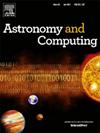Karabo:一个多功能SKA观测模拟框架
IF 1.8
4区 物理与天体物理
Q2 ASTRONOMY & ASTROPHYSICS
引用次数: 0
摘要
Karabo是一个通用的基于python的软件框架,简化了射电天文学数据的研究。它将现有的软件包捆绑成一个连贯的整体,以提高其组件的易用性。Karabo包含有用的抽象,例如扩展和并行化典型工作负载或特定于科学的Python模块的策略。该框架包括访问数据集和模拟观测的功能,以研究平方公里阵列(SKA)仪器及其预期精度。SKA将解决天文学广泛领域的问题。我们演示了Karabo在一些SKA科学案例中的应用,包括高强度测绘、射电测量模拟、射电源探测、再电离时代和太阳物理学。我们讨论了在SKA背景下模拟大型无线电数据集的能力、可扩展性和挑战。本文章由计算机程序翻译,如有差异,请以英文原文为准。
Karabo: A versatile SKA observation simulation framework
Karabo is a versatile Python-based software framework simplifying research with radio astronomy data. It bundles existing software packages into a coherent whole to improve the ease of use of its components. Karabo includes useful abstractions, like strategies to scale and parallelize typical workloads or science-specific Python modules. The framework includes functionality to access datasets and mock observations to study the Square Kilometre Array (SKA) instruments and their expected accuracy. SKA will address problems in a wide range of fields of astronomy. We demonstrate the application of Karabo relevant to some of the SKA science cases from HI intensity mapping, simulation of the radio surveys, radio source detection, the epoch of re-ionization and heliophysics. We discuss the capabilities, scalabilities and challenges of simulating large radio datasets in the context of SKA.
求助全文
通过发布文献求助,成功后即可免费获取论文全文。
去求助
来源期刊

Astronomy and Computing
ASTRONOMY & ASTROPHYSICSCOMPUTER SCIENCE,-COMPUTER SCIENCE, INTERDISCIPLINARY APPLICATIONS
CiteScore
4.10
自引率
8.00%
发文量
67
期刊介绍:
Astronomy and Computing is a peer-reviewed journal that focuses on the broad area between astronomy, computer science and information technology. The journal aims to publish the work of scientists and (software) engineers in all aspects of astronomical computing, including the collection, analysis, reduction, visualisation, preservation and dissemination of data, and the development of astronomical software and simulations. The journal covers applications for academic computer science techniques to astronomy, as well as novel applications of information technologies within astronomy.
 求助内容:
求助内容: 应助结果提醒方式:
应助结果提醒方式:


